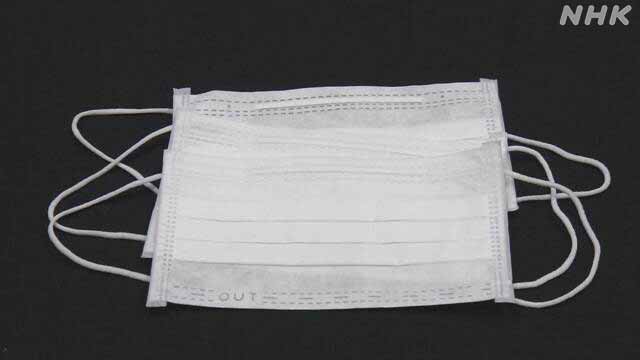Soaring raw material prices for masks Japanese manufacturers are in a difficult position Corona April 23, 16:29
The prices of raw materials such as non-woven fabrics are soaring due to the global competition for masks, and Japanese mask makers trying to increase their supply are in a difficult position.
Shirohato, a major mask maker headquartered in Nagoya, has doubled the production by doubling the factory in the city since 20th of this month.
Since it is difficult to increase production further in Japan, we are trying to increase imports from Chinese factories that outsource production. However, we are in a situation where we cannot increase the number of local imports.
In China, the prices of raw materials such as non-woven fabrics and rubber strings have risen by a factor of about 10 due to the impact of Western governments and manufacturers purchasing at high prices in order to secure large quantities of masks.
In order to be profitable, it is necessary to raise the domestic sales price significantly, but we are cautious about raising the retail price because supermarkets, etc. to which the products are delivered may receive repulsion from consumers.
The manufacturer has no choice but to increase imports from China in order to eliminate the mask shortage, and in order to do so, it is necessary to properly reflect the increased costs in domestic retail prices.
Takeshi Tsuda, Managing Executive Officer of Shirato, said, “If we want to make a drastic solution in a short period of time, the government, like other countries, will hold money at a Chinese factory and pull a mask. If there is a mechanism that allows consumers to understand the proper price under the market, they can buy it from China without fear, '' he said. I pointed out that it is important.
No prospect of eliminating mask shortage
Despite increasing production by domestic manufacturers and resuming imports from China, the mask shortage is not expected to disappear.
Demand has explosively increased due to the spread of the new coronavirus, but the government has not been able to grasp how much demand there is.
Assuming that all citizens use one copy per day, it is necessary to calculate about 3 billion copies or more per month.
On the other hand, due to the increase in production by domestic manufacturers, the monthly supply amount of 400 million sheets in February was increased to more than 700 million sheets this month, but the demand is not keeping up.
The key to increasing the supply is the expansion of imports made in China, which used to account for about 70% of the masks distributed in Japan. However, the current monthly import volume from China is about 120 million.
Behind this is the soaring prices of raw materials such as non-woven fabrics and rubber strings. According to a government survey, the purchase price per disposable mask, which was 5 yen to 7 yen, is currently about 50 yen, which is about 10 times higher.
However, major domestic supermarkets and drug stores are cautious about raising retail prices in the face of insufficient masks, and are not accepting high-priced purchases.
On the other hand, there are cases where a new manufacturer who has begun importing and selling masks sells 50 masks at a price of 4000 yen, which is more expensive than before.
It is expected that retail prices will rise if imports from China increase significantly, and it is difficult to achieve both an “increased supply” and “price stability”.
Masks for medical institutions
The government distributes the masks that are indispensable at medical institutions at about 100 million pieces per month and purchased in bulk or stored in each ministry.
Since last month, we have distributed about 57 million copies centering on designated medical institutions for infectious diseases, and we plan to distribute 770,000 copies of a high-performance mask called N95 during this month.
However, as of the beginning of last month, the Japan Medical Association urgently conducted an investigation through the medical associations of each prefecture and found that it needed 400 to 500 million copies per month.
The government will continue to procure masks and distribute them to medical institutions at any time, but it is necessary to confirm that they meet a certain level of quality, so the amount that can solve the shortage in a short period of time. Is difficult to buy.

